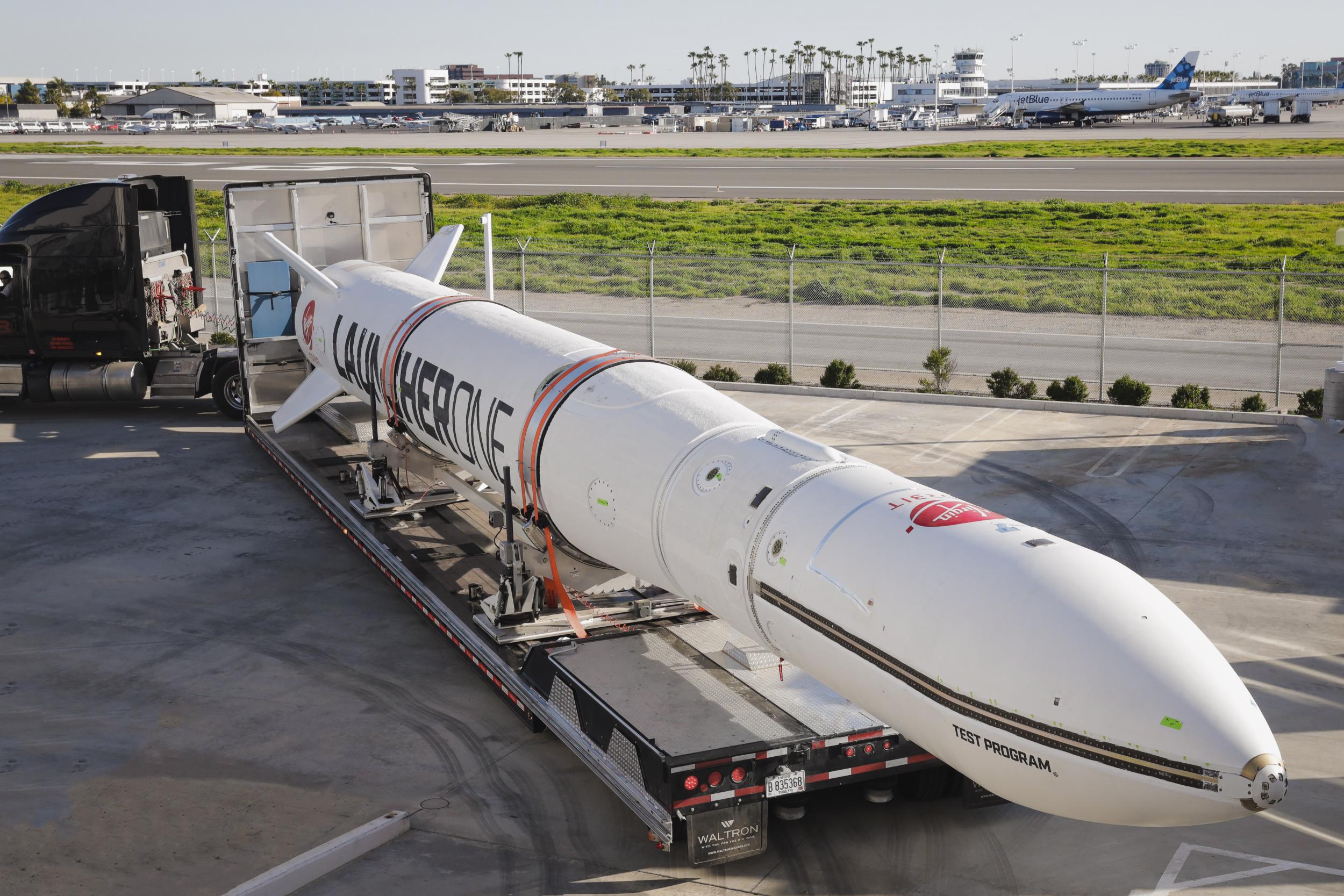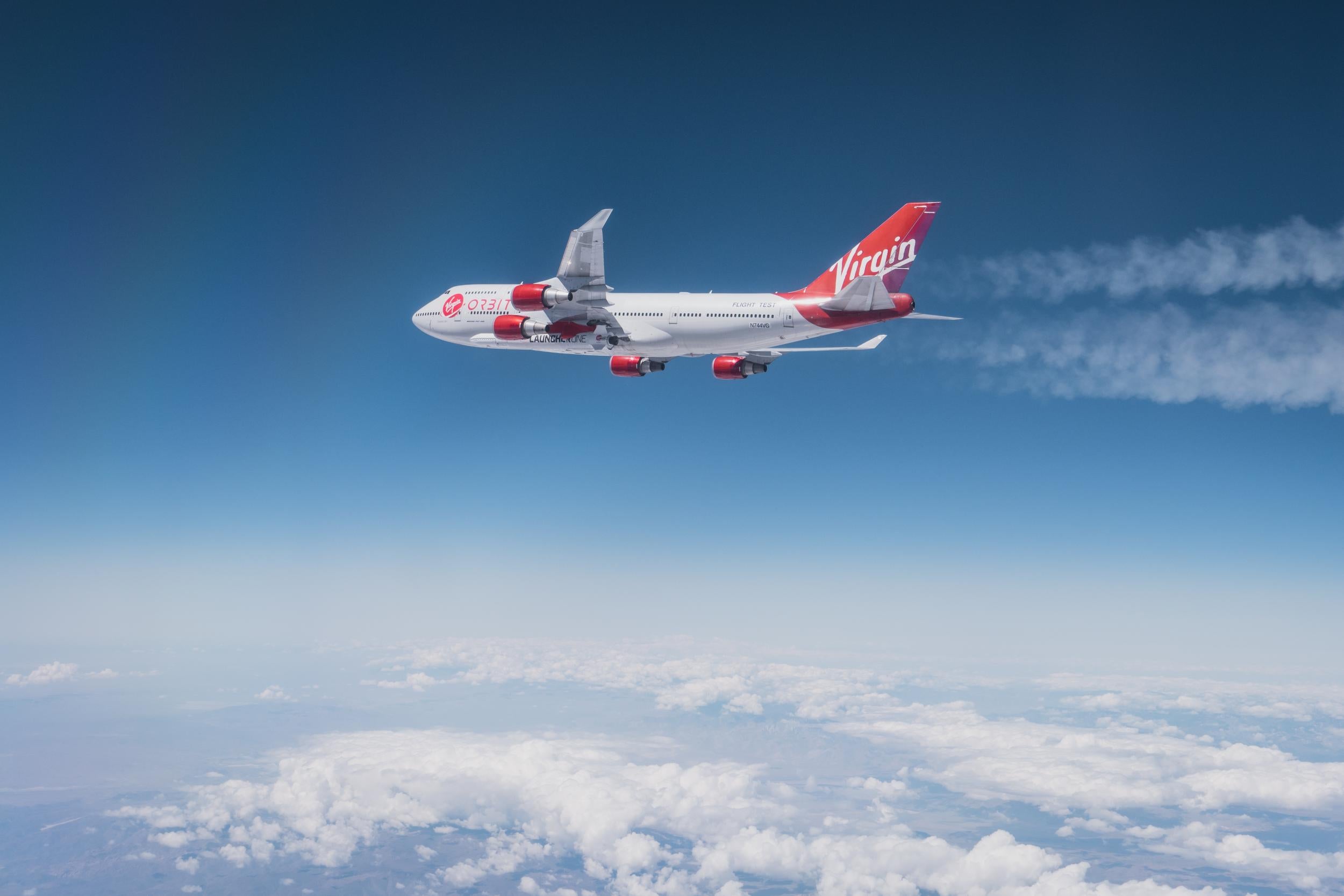Virgin Orbit's first rocket launch over Pacific Ocean hits snag
Richard Branson aims to launch satellites for a fraction of current costs
Your support helps us to tell the story
From reproductive rights to climate change to Big Tech, The Independent is on the ground when the story is developing. Whether it's investigating the financials of Elon Musk's pro-Trump PAC or producing our latest documentary, 'The A Word', which shines a light on the American women fighting for reproductive rights, we know how important it is to parse out the facts from the messaging.
At such a critical moment in US history, we need reporters on the ground. Your donation allows us to keep sending journalists to speak to both sides of the story.
The Independent is trusted by Americans across the entire political spectrum. And unlike many other quality news outlets, we choose not to lock Americans out of our reporting and analysis with paywalls. We believe quality journalism should be available to everyone, paid for by those who can afford it.
Your support makes all the difference.Sir Richard Branson’s launch mission for a revolutionary satellite delivery system has been postponed due what his Virgin Orbit company calls “an abundance of caution” following a sensor fault.
The plan was to ignite the LauncherOne rocket engine in mid-air from a Boeing 747 for the first time. A test window started at 6pm UK time on Sunday 24 May at the Mojave Air and Space Port in California.
The company tweeted: ”Everything has been proceeding smoothly: team, aircraft, & rocket are in excellent shape. However, we have one sensor that is acting up.
“Out of an abundance of caution, we are offloading fuel to address. This means we are scrubbed for today.
“Currently, it appears we’ve got a straightforward path to address this minor sensor issue and recycle quickly. The crew are already hard at work putting that plan into action.”
There is another window on Monday for the Jumbo jet and rocket combination to take off and climb to 35,000 feet (almost seven miles) over the Pacific.
Holidaymakers who once shuttled between the UK and Las Vegas, and businesspeople who stretched out from Heathrow to Los Angeles, will readily recognise the red-and-white Boeing 747 named Cosmic Girl.
The 18-year-old Jumbo flew the Virgin Atlantic nest five years ago to a new home at Long Beach in California, the West Coast hub for space research.
The former passenger jet has the satellite launch rocket secured to the left wing. It uses a pod installed originally for hauling a fifth engine.
The Long Beach-based firm – part of Sir Richard Branson’s Virgin empire – aims dramatically to cut the cost of launching a satellite into earth orbit from a current price tag as high as $100m (£82m).
Using the 20th century technology of a Boeing passenger plane as a mother ship, Hart believes he can get the cost of a 21st-century launch down to less than the equivalent of £10m.
Ahead of the launch, The Independent was given exclusive access to the project – and Dan Hart, the president and CEO of Virgin Orbit.
“What’s happening in space is: just like your iPhones got smaller and smaller and more dense with electronics, satellites are doing the same thing. And what they need, now that they’re small, is a ride to orbit.” he said.
“Using our re-usable 747 to go off, and come back and do another mission opens up the door to a whole bunch of businesses, scientific experiments and government missions that otherwise wouldn’t be affordable.
“We’re taking quite a nice step down in price: $12m [£9.9m] is actually quite a bit less than it used to be.”

Typically satellites in geo-stationary orbit – fixed above the same point on the earth’s surface – are more than 20,000 miles from the planet. So saving the odd seven miles by hitching a ride on a Jumbo jet might seem insignificant.
But, said Dan Hart, breaking away from ground level is the hardest part: “We don’t have to fight our way through all that thick nitrogen and oxygen and humidity down at sea level, and secondly not only do we have eight miles but we go to nearly Mach 1 when we release.
“So the rocket has altitude and velocity, and rockets love altitude and velocity.”

Distant dreams: as a Virgin Atlantic jet, the Boeing 747 flew frequently between the UK and US (Virgin Orbit)
The Virgin Orbit system is also far more flexible than ground-based launches from Cape Canaveral in Florida and the Ariane Spaceport in Guyane, South America. Weather delays can be virtually eliminated.
The test firing of the two-stage rocket aims to provide proof of concept – though the company warns success is far from guaranteed: “Thousands of components all need to function as planned while controlling high energy and flying at incredibly fast speeds.
“The vehicle’s structures must be robust enough to tolerate travelling at up to 18,000 mph without disintegrating; the temperatures and pressures of its propellants can’t be too high or too low; every internal valve must click open and closed in perfect synchronicity.
“There’s a long list of factors that need to line up in order to make it all the way.”
The pressure is on and the odds are only 50:50. Maiden flights for previous space flight systems have typically ended in failure about half the time.
It comes at the start of a busy week for privately funded space ventures.
On Wednesday, Elon Musk’s SpaceX firm aims to take two Nasa astronauts, Doug Hurley and Bob Behnken, to the International Space Station.
Their mission is the first crewed launch from US territory for nine years.
The pair will lift off from Launch Pad 39A at the Kennedy Space Center in Florida in a Crew Dragon capsule on top of a SpaceX Falcon rocket.
Nasa said: “Crew Dragon will accelerate its two passengers to approximately 17,000 mph and put it on an intercept course with the International Space Station.”
There’s understanding of the world that we need to gain. Space is making it easier for us to communicate
The rocket maker said: “Falcon 9 is the world’s first orbital class reusable rocket. Reusability allows SpaceX to refly the most expensive parts of the rocket, which in turn drives down the cost of space access.
The launch is scheduled for 8.33pm on 27 May.
Sir Richard Branson is seeking to send humans into space with his Virgin Galactic enterprise, which is planning “a regular schedule of spaceflights for private individuals and researchers”.
The company says: “Our initial operations will give us unequalled experience of flying large numbers of non-professional astronauts, safely and enjoyably, in high acceleration and micro-gravity environments.”
The flights will reach low earth orbit, around 60 miles above sea level.
While Virgin Orbit is in a very different business from manned space flight, Dan Hart believes exploration and exploitation of the cosmos is beneficial for humanity.
“There’s understanding of the world that we need to gain. Space is making it easier for us to communicate.
“There are still about three billion people who don’t have those kinds of capabilities, so there’s work to be done to get those people access to the internet,” he said.
“There’s an enormous amount that space can do to make life on earth better, to make us a more efficient species and to improve the world in general.”

Join our commenting forum
Join thought-provoking conversations, follow other Independent readers and see their replies
Comments